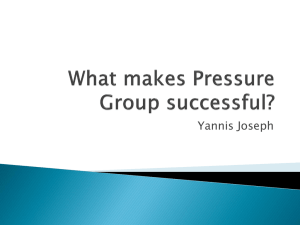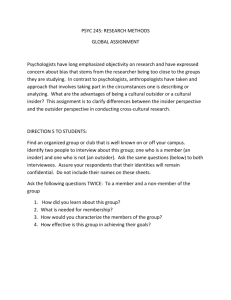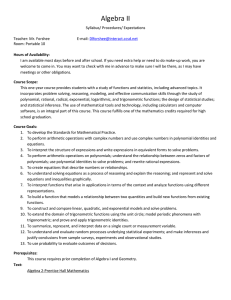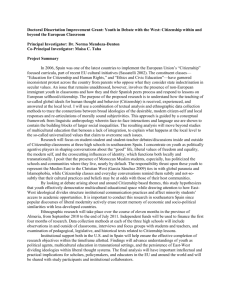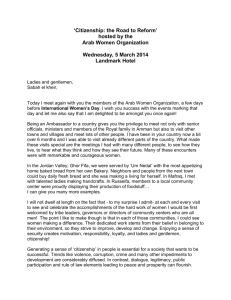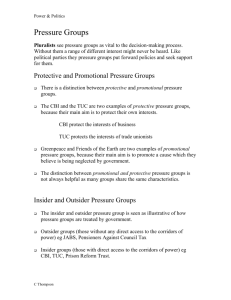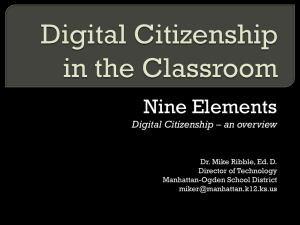Absent Citizens: Making Citizenship Accessible
advertisement
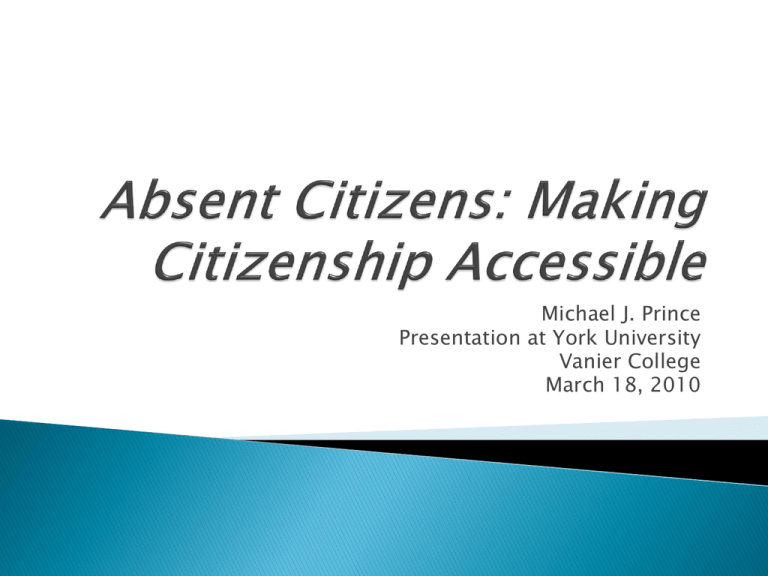
Michael J. Prince Presentation at York University Vanier College March 18, 2010 My locations Absent citizens and related concepts What is citizenship Making citizenship accessible Continuing thoughts 2 Outsider in the inside of the movement Insider on the outside of the academy Outsider/Insider connections Who and what prompted me to write this book 3 Absence of persons with disabilities in at least four ways: 1. Lacking formal rights and membership status in political communities 2. Gaps in, and obstacles to actual practices in various aspects of life 3. Overlooked in social science studies and theory 4. Excluded from most definitions and discussions of citizenship 4 Absent citizens are the effects of the exercise of power in specific places, certain groups, numerous areas of life and time periods Absent citizens are not totally outside the community, but are socially produced and politically positioned in marginalizing ways Think always of “absent/present citizens” together 5 Concept Focus Authors Second-class citizens Economic class and social status Eisenberg 1982; Roche 1992; Heater 2004 Citizens minus/Citizens plus Place of First Nations and other indigenous peoples in Canada Hawthorn-Tremblay reports 1966-67; Cairns 2000; Pothier and Devlin 2006 Underclass Economic class and race in America Mouffe 1991 Silenced citizens Children’s rights and lack of voice Andreychuk & Fraser 2007 Marginal matrix of citizenship Social, political and economic oppression Yuval-Davis, 1997 Un-, sub-, quasi-, marginal citizens, and super-citizens Hierarchy of human rights and status groups in European community Nash 2009 6 Universalistic income security at adequate and reliable levels through the life course Inclusive education Gainful employment with appropriate supports in inclusive workplaces Affordable and available supply of personal supports, housing, and community services Universal design for physical environments, electoral systems, and systems of communication, transportation and information Mechanisms to tackle systemic discrimination and to promote human rights for all 7 A fluid mix of ideas and frames, relations, resources “A sense of belonging in one’s country and gives each individual the right to participate in society and in its economic and political systems” Scott Task Force Report, 1996 In Absent Citizens, I explore five elements: discourse, legal and equality, democratic and political, fiscal and social, and economic 8 By grounding it in actual lived experiences, embodied needs and capacities By raising critical awareness and public understanding of status quo By removing community barriers and social wrongs By respecting and promoting human rights & human dignities 9 Widespread and thorough inclusion is a reality for a relative minority The project of making citizenship accessible has both theoretical and practical elements (the academy and the movement ; insider/outsider dynamics) Citizenship is a bundle of legal statuses and lived practices of embodied subjects in complex societies with ambivalent values What kinds of politics will support the development of rights, access and inclusion? 10 11 Access Centre – Able York Graduate Program in Critical Disability Studies Students for Barrier-free Access, University of Toronto 12
